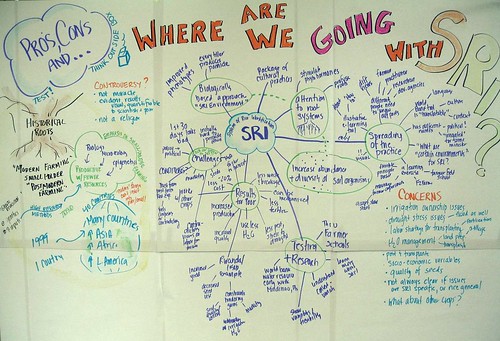For those of you interested in visual thinking and graphic recording, take a look at this! Brandy was inspired to do a visual capture of Obama’s inaguration speech – something quite different than she normally does.
Brandy Agerbecks Graphic Facilitation Work
I was really interested to read about her process…
… I ended up scribbling down the main points I heard in pencil on a notebook. Not a real-time drawing. And as I scribbled notes, I realized that it was critical to quote Obamas words. One of my skills is to distill points into shorter, clearer phrases. Because this content was recorded and would be quoted, it was good to keep it in Obamas voice, even if it took my shape, my synthesis.
After I scribbled the notes, I downloaded a transcript. I highlighted the phrases that resonated with me when I listened live. Next, I needed to figure out how to wrap these points around the Obama banner I had drawn as a centerpiece. I started knowing that the O would be a face saying a major point. I chose to make that “Greatness is never a given. It is earned.” I built the main point around the banner, though not strictly in linear order.
I was very curious what pieces of the speech would be made into soundbites. As I prepped this image, I listened to NPR and I was glad to hear a lot of the pieces of the drawing being repeating on air.
Her reflection about capturing Obama’s exact words brought to mind one of the challenges/questions I face when doing either text or visual summaries of group conversations. How important is individual recognition and ownership of the words? When are quotes essential and when does distillation add more. Clearly in this case there was a sole focus on Obama. But Brandy’s articulation of the point gave me food for thought.
What do you do when you summarize online or F2F group interactions? What is your harvesting practice?

 Last Friday I had the great fortune to help facilitate a session at
Last Friday I had the great fortune to help facilitate a session at 
 Last Tuesday I was in Rome at the
Last Tuesday I was in Rome at the